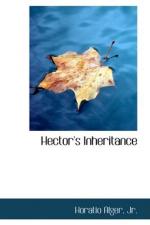“Perhaps that is not the word. My brother and his wife were boarding in Sacramento in the winter of 1859. In the same boarding house was a widow, with a child of some months old. You were that child. Your mother died suddenly, and it was ascertained that she left nothing. Her child was, therefore, left destitute. It was a fine, promising boy—give me credit for the compliment—and my brother, having no children of his own, proposed to his wife to adopt it. She was fond of children, and readily consented. No formalities were necessary, for there was no one to claim you. You were at once taken in charge by my brother and his wife, therefore, and very soon they came to look upon you with as much affection as if you were their own child. They wished you to consider them your real parents, and to you the secret was never made known, nor was it known to the world. When my brother returned to this State, three years after, not one of his friends doubted that the little Hector was his own boy.
“When you were six years old your mother died—that is, my brother’s wife. All the more, perhaps, because he was left alone, my brother became attached to you, and, I think, he came to love you as much as if you were his own son.”
“I think he did,” said Hector, with emotion. “Never was there a kinder, more indulgent father.”
“Yet he was not your father,” said Allan Roscoe, with sharp emphasis.
“So you say, Mr. Roscoe.”
“So my brother says in his letter to me.”
“Do you think it probable that, with all this affection for me, he would have left me penniless?” asked the boy.
“No; it was his intention to make a will. By that will he would no doubt have provided for you in a satisfactory manner. But I think my poor brother had a superstitious fear of will making, lest it might hasten death. At any rate, he omitted it till it was too late.”
“It was a cruel omission, if your story is a true one.”
“Your—my brother, did what he could to remedy matters. In his last sickness, when too weak to sign his name, he asked me, as the legal heir of his estate, to see that you were well provided for. He wished me to see your education finished, and I promised to do so. I could see that this promise relieved his mind. Of one thing you may be assured, Hector, he never lost his affection for you.”
“Thank Heaven for that!” murmured the boy, who had been deeply and devotedly attached to the man whom, all his life long, he had looked upon as his father.
“I can only add, Hector,” said Mr. Roscoe, “that I feel for your natural disappointment. It is, indeed, hard to be brought up to regard yourself as the heir of a great estate, and to make the discovery that you have been mistaken.”
“I don’t mind that so much, Mr. Roscoe,” said Hector, slowly. “It is the hardest thing to think of myself as having no claim upon one whom I have loved as a father—to think myself as a boy of unknown parentage. But,” he added, suddenly, “I have it only on your word. Why should I believe it?”




